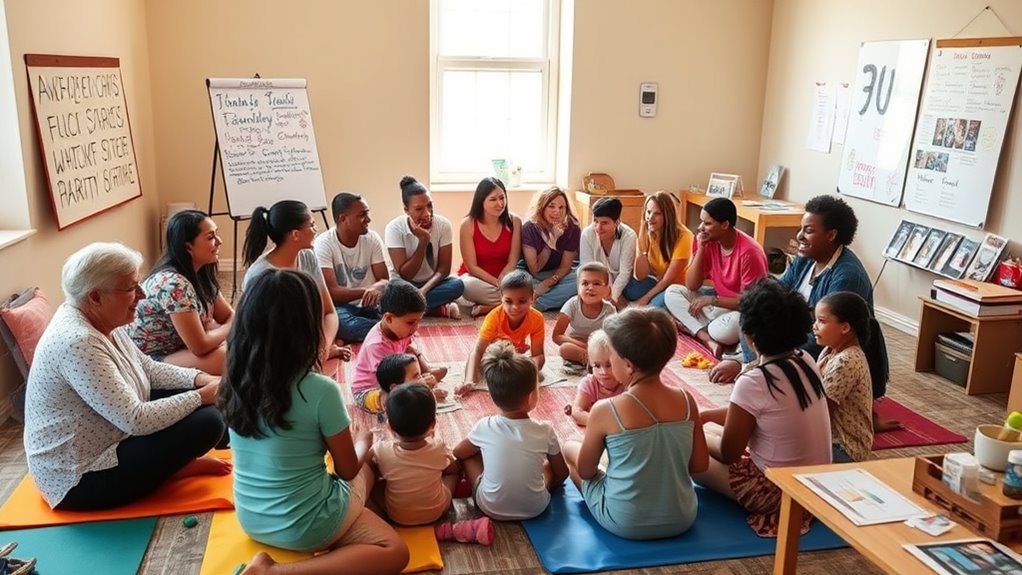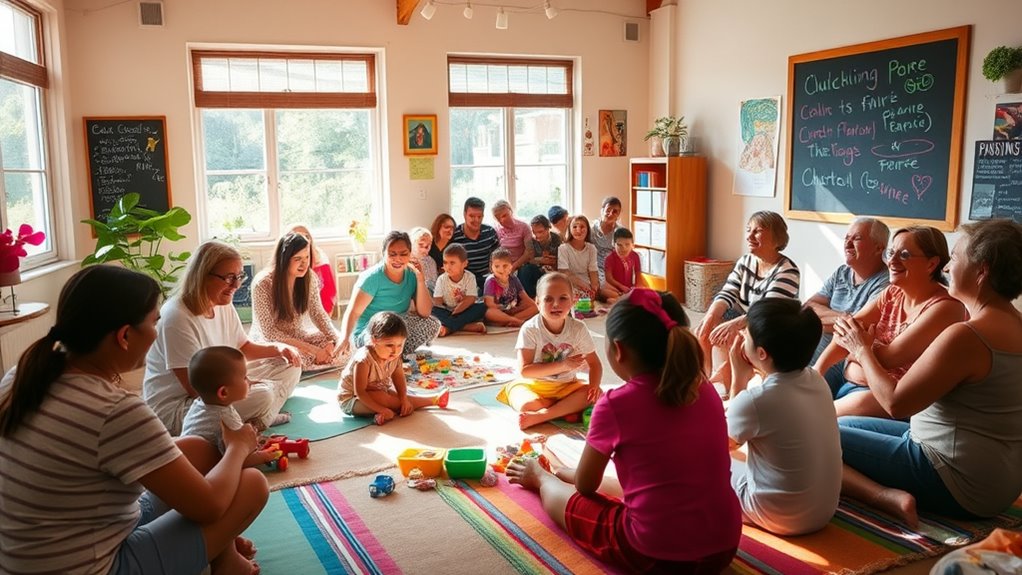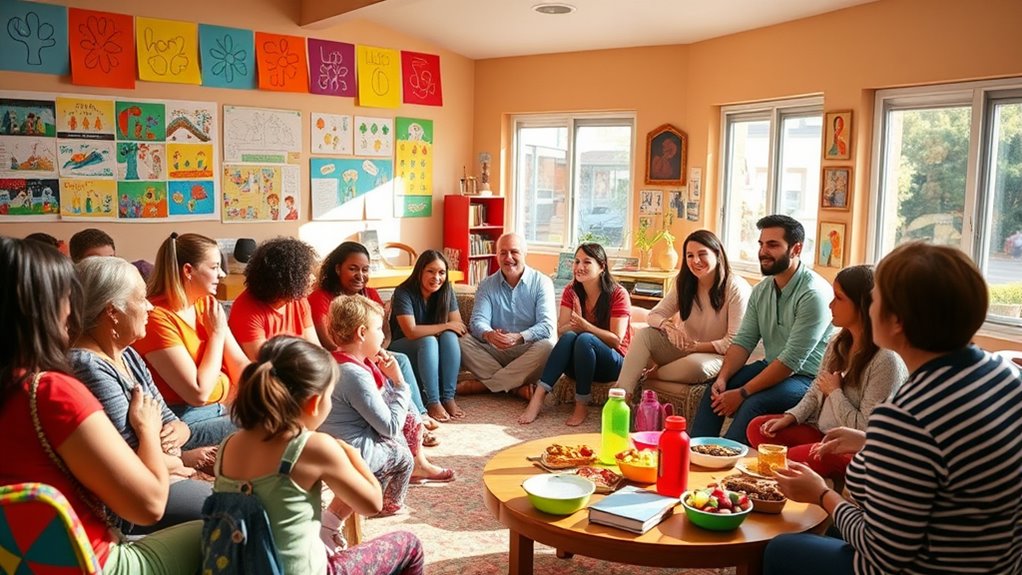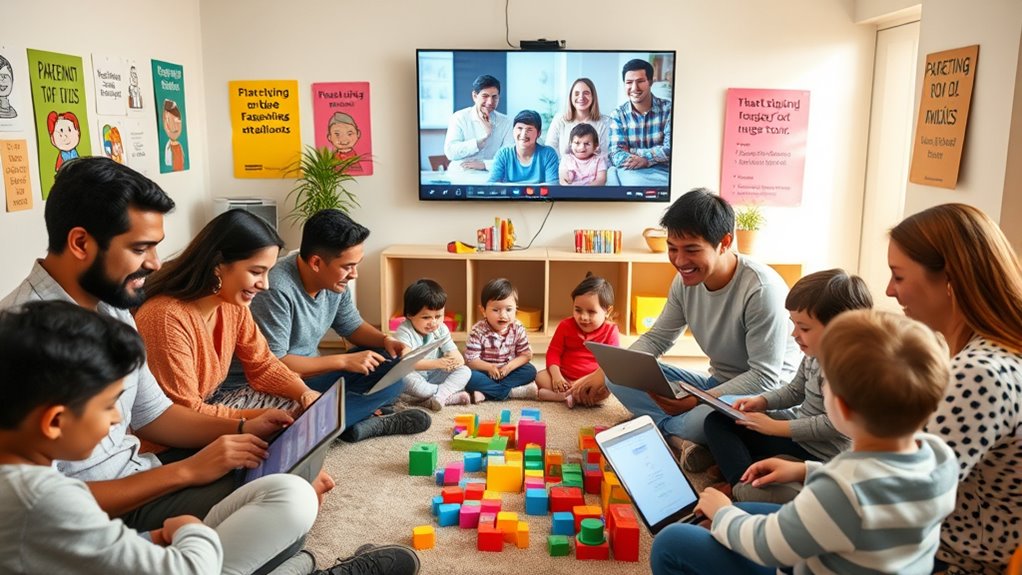Parenting workshops and support groups are fantastic ways to connect with other families while improving your parenting skills. These platforms foster a sense of community, providing emotional support and reliable resources. You’ll learn effective communication techniques and gain insights into co-parenting, all in a non-judgmental environment. Plus, they often incorporate technology to make participation easier. To discover the full range of benefits and options available, keep exploring what these programs can offer!
Key Takeaways
- Parenting workshops foster community by connecting families facing similar challenges, enhancing support and encouragement through shared experiences.
- Support groups provide a safe space for parents to share feelings, build relationships, and gain emotional support from peers.
- Workshops often include interactive sessions that encourage networking and collaboration among families, promoting lasting connections.
- Utilizing online platforms allows families to engage with support groups and workshops, making it easier to connect and participate.
- Engaging in co-parenting strategies within group settings helps families learn effective communication and build stronger relationships with others.
The Benefits of Parenting Workshops

Parenting workshops offer numerous benefits that can greatly enhance your parenting journey. They promote positive parenting practices, helping you encourage nurturing behaviors while steering clear of harsh punishment.
You’ll develop essential skills like communication, confidence, and problem-solving, which can make a significant difference in your daily interactions. These workshops are often culturally relevant, adapting to diverse family needs. Additionally, they are particularly beneficial for low-income families, ensuring that all parents have access to valuable resources.
By teaching stress management techniques, they help reduce parental stress, allowing you to enjoy parenting more. Plus, many workshops use evidence-based methods, proven effective through research.
All these factors contribute to a supportive environment for both you and your children, fostering their emotional and cognitive development while improving your mental health and confidence as a parent.
Enhancing Co-Parenting Relationships

How can you enhance your co-parenting relationship for the benefit of your children? Start by prioritizing effective communication. Use tools like co-parenting apps to keep discussions organized and accessible.
Practice active listening—hear your co-parent’s perspective without interrupting. When expressing your feelings, use “I” statements to avoid sounding confrontational.
Develop a co-parenting plan that outlines visitation schedules and communication methods, focusing on your child’s best interests. Staying informed about key elements of a successful co-parenting plan can further strengthen your approach. Stay flexible to adapt to changing circumstances. Co-parenting dynamics can vary significantly between families, so find strategies that work best for your unique situation.
During conflicts, employ solution-focused strategies to keep discussions productive. Remember, consistency in rules and routines across households provides stability for your children.
Finally, engage in self-care to manage stress, ensuring you’re both emotionally equipped for successful co-parenting.
The Role of Support Groups in Parenting

While maneuvering the challenges of raising children, many parents find solace and support in parenting groups. These groups provide a non-judgmental space where you can share feelings and experiences, fostering emotional support and reducing isolation. Participating in these groups offers a chance to engage with reliable resources that can guide you through the early stages of parenthood. Additionally, understanding how to create a conducive environment for senior living can be beneficial for families in multiple generations.
By connecting with others, you build a sense of community and gain practical advice on daily challenges like caregiving and steering through health systems. Support groups empower you to advocate for your child’s needs confidently, enhancing your parenting skills. Additionally, these groups can serve as invaluable resources for parents of children in therapy, helping to navigate the complexities of child therapy situations. Engaging in discussions about sleep training methods can also provide insights into managing your child’s sleep challenges. Moreover, the emotional well-being of parents can significantly improve, similar to how pet therapy benefits individuals with dementia and Parkinson’s, by providing companionship and reducing feelings of isolation. Regular participation can lead to stress reduction and improved mental health, making you feel more equipped to handle parenting demands. Ultimately, these groups enrich parent-child relationships and create a supportive environment where you can thrive.
Furthermore, sharing experiences about puppy socialization can also help parents with pets understand how to manage their dogs while raising children.
Types of Parenting Interventions Available

When traversing the complexities of child-rearing, you’ll find a variety of parenting interventions designed to support you in enhancing your skills and fostering a nurturing environment.
Family-based interventions focus on the entire family unit, promoting emotional coaching techniques and improving household routines. You can participate in these sessions in community settings, either one-on-one or in groups, sometimes using technology for remote access.
Parenting style interventions guide you toward effective styles, with authoritative parenting often recommended for its balanced approach. The content of these interventions emphasizes your strengths, cultural beliefs, and healthy parent-child interactions while addressing negative attitudes. These interventions often highlight the benefits of authoritative parenting for emotional stability and positive child development.
With these diverse options, you can choose what best fits your family’s needs and goals.
Positive Outcomes for Children

Positive outcomes for children often stem from the implementation of effective parenting practices. When you adopt positive parenting techniques, you help reduce stress and frustration, creating a happier family dynamic.
Understanding your child’s developmental stages equips you to make informed decisions, while fostering emotional well-being encourages their mental health. Your efforts lead to higher self-esteem and better emotional regulation in your kids, enabling them to navigate social situations with ease.
Additionally, supportive parenting reduces behavioral issues and boosts academic performance. By participating in workshops, you enhance your problem-solving skills, strengthen your parent-child relationship, and create a nurturing environment that promotes resilience and success. Establishing healthy boundaries also plays a crucial role in ensuring that children feel secure and respected within the family dynamic.
Ultimately, positive parenting practices set the foundation for a brighter future for your children.
Factors Influencing Participation in Programs

Effective parenting practices can lead to significant improvements in children’s lives, but understanding the factors that influence participation in parenting programs is equally important.
You might consider perceived benefits, as many parents join when they see behavioral issues in their children. Your education level can also play a role; those with higher education are more likely to attend.
Socioeconomic status and time constraints often hinder participation, while including children in programs can boost your engagement.
Parenting stress and logistical challenges, like childcare and transportation, can act as barriers too.
Finally, cultural backgrounds and family dynamics influence your decision. Recognizing these factors can help you navigate and enhance your participation in valuable parenting programs.
Structure and Delivery of Workshops

To maximize the benefits of parenting workshops, it’s crucial to understand their structure and delivery methods. Workshops focus on specific topics based on local needs, using curricula developed from reliable literature.
You’ll find learning materials like leader guides and PowerPoints to guarantee consistent content delivery. Interactive sessions engage you through discussions, while practical activities reinforce learning. Group sessions foster peer support and sharing experiences.
Some workshops are available online for added flexibility, and personal support through consultations and home visits is also offered. Experienced presenters provide authoritative guidance, and ongoing training keeps them updated on best practices.
Feedback mechanisms are in place to enhance effectiveness, guaranteeing a positive and impactful experience for all participants.
Engaging Families Through Technology

As technology continues to evolve, engaging families through digital platforms offers a unique opportunity to enhance communication and support in parenting.
Mobile apps like Vroom and Kinedu provide fun learning activities, while text messaging helps share quick tips and reminders, especially for families with limited internet access.
Social media platforms, particularly Facebook, create online communities where parents can connect and share information.
Videoconferencing tools allow for virtual support groups, fostering connections regardless of distance.
To maximize involvement, consider using surveys to understand families’ tech preferences and share educational resources through blogs or newsletters.
Frequently Asked Questions
What Age Groups Are Suitable for Parenting Workshops?
Parenting workshops cater to various age groups, starting with infants and toddlers (0-3 years) where you can learn about attachment and developmental milestones.
For preschoolers (3-6 years), workshops focus on social skills and behavior management.
School-age programs (6-12 years) emphasize academic support and emotional development, while workshops for teenagers (13-18 years) tackle adolescent challenges and effective communication.
No matter the age, these workshops offer valuable insights for your parenting journey.
How Can I Find Parenting Workshops in My Area?
To find parenting workshops in your area, start by checking online directories like Active Parenting.
Local community organizations and educational institutions often host workshops, so keep an eye on their announcements.
Pediatric clinics and health centers can also provide valuable resources.
Don’t forget to browse social media platforms, like Facebook, where many workshops are advertised.
Connecting with others can lead you to the right opportunities tailored for your needs.
Are There Fees Associated With Parenting Workshops or Support Groups?
Yes, there are fees associated with parenting workshops and support groups, but they vary widely. Some workshops are free, while others may charge a nominal fee.
Many organizations offer scholarships for those who can’t afford these costs. Additionally, specific programs might’ve higher fees, especially if materials are included.
It’s worth checking local resources and online options to find affordable opportunities that fit your budget and needs.
Can Grandparents or Caregivers Attend These Workshops?
Yes, grandparents and caregivers can attend these workshops. They’re designed to support individuals like you who are raising grandchildren.
You’ll find valuable information on modern parenting practices, technology, and effective caregiving strategies.
Plus, attending these sessions allows you to connect with others facing similar challenges, fostering a sense of community.
How Long Do Parenting Workshops Typically Last?
Imagine attending a workshop that transforms your parenting in just a few days.
Parenting workshops typically last anywhere from a single session to several weeks. For instance, a two-day intensive workshop might dive deep into family dynamics, while a seven-week program offers gradual skill-building.
You might find sessions lasting 60 to 90 minutes each week, giving you the flexibility to learn at your pace and apply those skills in real-life situations.
Conclusion
To summarize, participating in parenting workshops and support groups isn’t just about learning; it’s about building a community. When you connect with other families, you discover that you’re not alone in this journey. Just like a tree thrives in a forest, you too can flourish with the right support. By embracing these opportunities, you’re not only enhancing your parenting skills but also paving the way for positive outcomes for your children. So, why wait? Join the conversation today!









